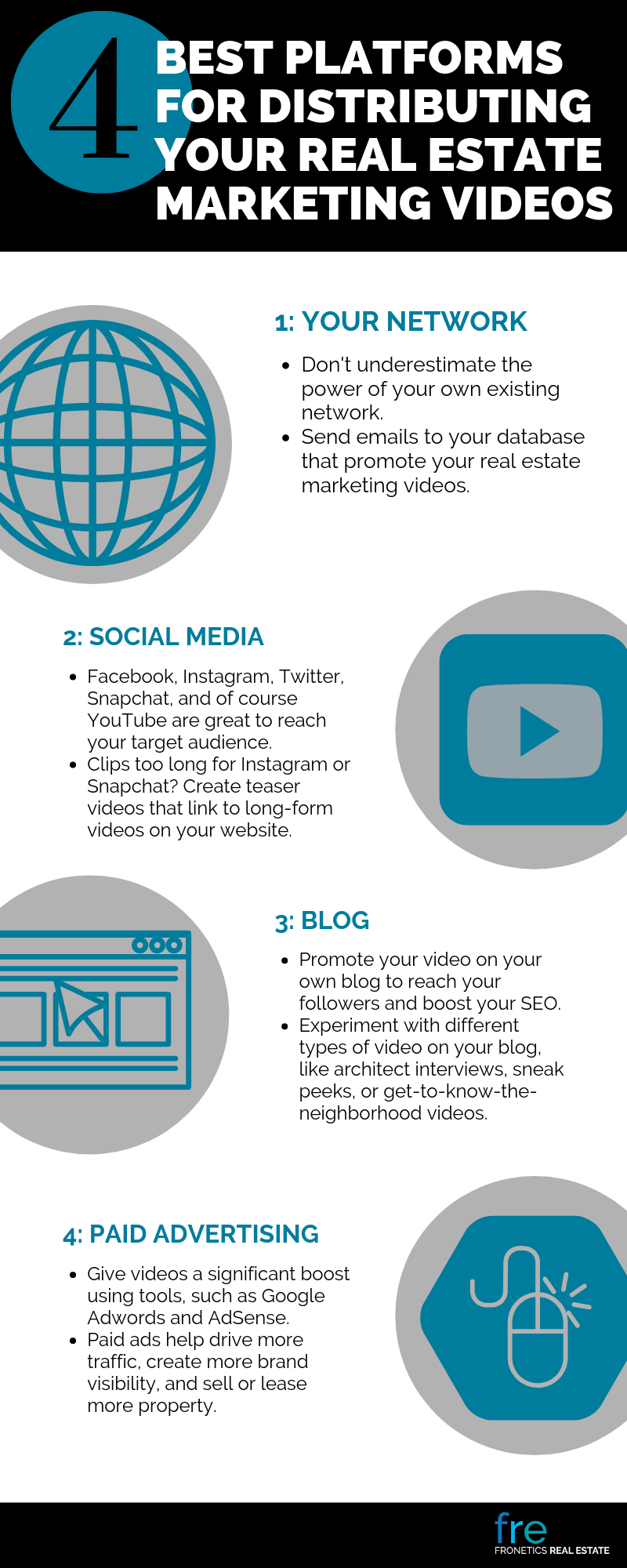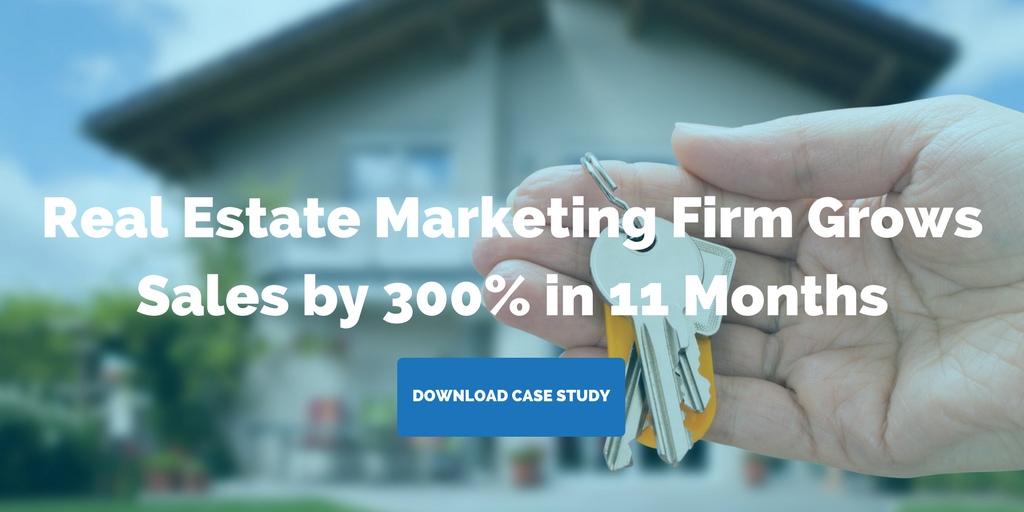Archive for the "Real Estate Marketing" Category

Infographic: Best Video Distribution Channels for Real Estate Marketing
Knowing the right video distribution channels for your real estate marketing videos can go a long way toward driving traffic and getting your content to your target audience.
Highlights:
- Choose video distribution channels that match your marketing goals.
- Don’t underestimate the power of your own network — use this network as the starting point for distribution.
- Paid ads can give video an extra boost.
You made the leap and embraced video marketing, the latest trend in digital marketing. The videos are informative and show what makes your brand unique, BUT they are not getting the views or shares you were expecting.
After dedicating your time and hard work (not to mention, marketing dollars), you want to make sure your real estate marketing videos are getting in front of your target audience and helping move buyers down the sales funnel. How can you do that? The answer is distribution.
Choosing the right platform (or platforms) to distribute your videos will help boost reach and ROI. But how do you know what platforms are right for you? Platforms and marketing trends are constantly changing; it’s hard to know which distribution channels are best for your target audience. Let us help.
Here are the four best video distribution channels for your real estate marketing videos.
1. Your network
Don’t underestimate the power of your own existing network. Send your videos, via email, to your primary contacts and everyone in your current database. In a recent study, emails with video had a 96% higher click-through rate than emails without video. With such increased engagement numbers, including video in your emails is surely a homerun.
2. Social media
Platforms like Facebook, Instagram, Twitter, Snapchat, and — of course — YouTube are great to reach your target audience. Within the social media category, you want to consider which platforms suit your content best. YouTube is a great place to start, but there are also many real estate specific online forums and social groups that can benefit you as well.
And don’t worry if you have longer videos that won’t work for platforms like Instagram. You can easily create teaser videos for promotion on Instagram that link to your long-form videos embedded on your website or video channel.
3. Blogs
Blogs are one of the easiest ways to drive organic traffic and increase lead generation. Promote your video on your own blog to reach your followers and boost your SEO. Blogs are also a great place to experiment with different types of marketing videos. Whether video tutorials, interviews, or even “Get to Know Us” videos, your blog is great place to capitalize on your videos by integrating them into your existing marketing efforts.
4. Paid ads
While the first three video distribution channels that we discussed are organic, sometimes it is well worth it to use paid ads to give your videos a significant boost, such as Google Ads. Paid ads help get your videos in front of prospective buyers and renters faster than would happen organically. Pair quality video with a comprehensive digital advertising strategy, and you will be in a position to drive more traffic, create more brand visibility, and sell or lease more properties.
Bottom line
We live in a highly visual world. Real estate marketing with video is an immediate and effective way to reach your audience and show them what makes your brand and properties special. Using the right video distribution channels helps you get the most out of your video marketing efforts.
Related posts:
- 6 Simple Tools for Creating Animated Real Estate Marketing Videos
- 4 Real Estate Blogging Tools You Should be Using
- 3 Ways to Boost Your Real Estate Marketing with Video
Archive for the "Real Estate Marketing" Category

Top 5 Real Estate Marketing Influencers
Influencer marketing capitalizes on the relationship between popular influencers and their followers to help your property get in front of the right buyers. Here are five of the top real estate marketing influencers in 2019.
Highlights:
- Influencer marketing is a form of marketing in which real estate marketers identify individuals who have influence over potential buyers and create marketing campaigns and activities around them.
- Real estate buyers trust influencers talking about your properties more than they trust you talking about yourself.
- Here are five of the top real estate marketing influencers whose content marketing strategies are driving their success.
Influencer marketing is a form of marketing in which real estate marketers identify individuals who have influence over potential buyers and create marketing campaigns and activities around these influencers. Why is this so effective? Because real estate buyers trust influencers talking about your properties more than they trust you talking about yourself.
Is influencer marketing effective?
The State of Influencer Marketing 2019 report shows that real estate marketers are already taking full advantage of this trend with 91% of marketers finding influencer marketing to be effective.
With the real estate industry constantly changing, it’s imperative for marketers to stay on top of new trends. There are tons of talented marketers posting daily content to attract new buyers. Here are five of the top real estate marketing influencers whose content marketing strategies are driving their success.
Top 5 real estate marketing influencers
1. Jay Baer
Jay Baer has 26 years of marketing and customer service expertise teaching businesses how to create a different customer experience that they notice and talk about. He is a New York Times best-selling author, founder of Convince and Convert, and co-author of Youtility for Real Estate. The book focuses on the core premise of Youtility — making your marketing so useful that people would pay for it — and shows how it works for real estate. With over 14,000 followers on Instagram alone, his blog, video, and social media posts are packed full of content marketing tips and are an excellent resource for real estate marketers.
2. Tom Ferry
Founder of Tom Ferry International, Ferry is a real estate coach and best-selling author of Life! By Design and Mindset, Model and Marketing! Ranked the #1 Real Estate Educator by Swanepoel Power 200 and racking up almost 50,000 Twitter followers, Ferry’s ever-growing influence impacts professionals in a wide variety of ways, including rigorous accountability coaching. His popular show, #TomFerryShow, delivers free, fresh, and relevant weekly real estate tips.
3. AmyChorew
Amy Chorew is a learning and technology trend expert, author, speaker, social media maven, and realtor. She is an expert on leveraging online marketing tools to dramatically increase property sales and is currently developing the learning platform for Better Homes and Gardens Real Estate. Chorew has over 20,000 Twitter followers and posts daily marketing tips aimed at real estate brands and developers.
4. Katie Lance
Katie Lance is strategist who specializes in social media and content marketing. She has worked with many real estate brands, including RE/MAXX LLC, Docusign, Homekeepr, and hundreds more. Lance is a trained public speaker focusing on the latest tools and strategies in social media, mobile, and technology. Her book, #GetSocialSmart, was a best-seller on Amazon. With over 31,000 Twitter followers, Lance creates and curates posts and video — check out her Vimeo channel — to educate real estate marketers on the latest trends and marketing idea.
5. Seth Price
Seth Price, author and keynote speaker, is a branding expert dedicated to empowering personal brands to turn recognition into revenue. Author of the new book, The Road to Recognition, An A-to-Z Guide to Personal Branding, Price is an expert on turning real estate brands into household names. He is the vice president of sales and marketing for Placester and one of the authors of their blog. Price also hosts “The Craft of Marketing and the Marketing Genius” podcasts, in addition to being a regular contributor to the Huffington Post, Marketing Profs, Realtor Magazine, and Inman News.
Related posts:
- 5 Real Estate Marketing Strategies for 2019
- How Inbound Marketing for Real Estate Works to Improve Sales
- How to Explain Content Marketing ROI to Win (or Keep) Buy-In
Archive for the "Real Estate Marketing" Category

Paid Social Advertising: Why Your Property Should Invest in Lead Ads
Paid social advertising can help accelerate your digital marketing efforts so your content gets in front of prospective buyers faster — they don’t even have to leave the app to sign up.
Highlights:
- 86% of marketers are using paid social advertising and organic tactics to boost leads through social media.
- Lead ads include a contact form that prospects can submit without ever leaving the app.
- Use paid social advertising to boost the reach of your posts, display ads, and videos.
There are 3.2 billion active daily users on social media platforms today. Clearly social media has some reach. In fact, 93% of B2B marketers report using social media as part of their strategy.
But as social media platforms continue to grow, it has become harder for marketers to stand out among the influx of content. So how do real estate marketers make sure audiences are seeing their properties? The answer: Paid advertising.
With 86% of marketers now combining paid and organic tactics as part of their social media strategies, you can hardly afford to be an observer.
How paid social advertising works
Paid ads on Facebook, Instagram, Twitter, and now LinkedIn, allow you to run lead-generation campaigns. Potential buyers and renters then come across your ad when they scroll through their newsfeeds. Just set the parameters (e.g. demographics, location, etc.) for your target audience, and the network’s algorithm will identify who sees the ad based on information they’ve provided in their profiles.
But here’s the real kicker: Unlike other ad types, lead ads include a contact form that prospects can fill out without ever leaving the app.
Need more convincing? Here at Fronetics Real Estate, we find Facebook Lead Ads one of the most effective for lead generation. The streamlined process and ease of signing up make it more likely prospects will convert to leads. Besides, you save time and money because you don’t have to create extra landing pages to capture their contact information.
Lead generation made easy
These days, people expect that everything from shopping to job searching can be done on their handheld devices. Paid social ads make that true for people wanting to learn more about potential properties.
Here’s how it works: When prospects click on a lead ad their contact information automatically populates the form based on information from their profile. They don’t have to leave Facebook (or other apps) to visit the property’s website or take time to fill out their contact information. Lead ads make submitting information as easy as two taps on a phone: one to open the ad and one to submit the information.
“Companies that invest in social media ads are more than twice as likely to say social media marketing is ‘very effective’ for their business.” 2019 State of Social Report
Creating and modifying your ads
As buyers continue to turn to their handheld devices for quick, easy information, paid social ads will give your property the opportunity to capture new leads with the click of a button. But just like any form of lead generation, you need to monitor and tweak your paid ads for optimal results.
Using tools like Facebook’s Ads Manager reporting interface, you can obtain reports about cost, impressions, and clicks. As with all marketing tools, consistent refinement is the key to success, particularly in real estate marketing. Lead ads can easily be fine-tuned to cultivate a larger target audience.
By investing in paid social advertising, you can boost the reach of your posts, display ads, and videos. Pair quality content with a comprehensive digital advertising strategy, and you will be positioned to drive more traffic, create more brand visibility, and sell or lease more properties.
Related posts:
- Paid Digital Advertising: A Beginner’s Guide for Real Estate Marketers
- How Pay-Per-Click Helped This Property Get 54 Leads
- The Role of Social Media in Luxury Real Estate Marketing
Archive for the "Real Estate Marketing" Category

5 Tips to Make Your Real Estate Website an Effective Selling Tool
Use your real estate website to boost engagement and drive sales. Here are five tips to start using your website as a selling tool in the sales process.
Highlights:
- In order to move visitors down the sales funnel, a brand’s website needs to be informative, visually pleasing, and functional.
- Your brand strategy should drive the layout, design and content to make sure all elements of your website align.
- A testimonial page on your website provides an opportunity for clients to talk about how satisfied they are with your properties, creating customer loyalty and increased brand trust.
Your real estate website can be a powerful tool in driving business growth. After all, it is the public face of your company. But the demands of digital marketing — social media, blog writing, video — can take center stage, leaving your website behind the scenes.
Real estate marketers need to give websites the attention they deserve. After all, most of your digital marketing efforts are driving visitors to your site. What happens once prospects get to your real estate website is key to the buyer’s journey. In order to move visitors down the sales funnel, a brand’s website needs to be informative, visually pleasing, and functional.
Here are 5 updates you should make to your company real estate website to help increase sales.
1. Brand messaging
Your website might be beautiful, but it also needs to be valuable. What makes your property different from other properties? What makes your brand better than the competition? Make sure that your website accurately depicts your brand and what makes it unique. Your brand strategy should drive the layout, design and content to make sure all elements of your website align.
2. Live chat
Did you know that 82% of consumers rate an “immediate” response as important or very important if they have a question? Live chat is one of the easiest ways to communicate with leads, in real time. The way prospects communicate with brands is changing. More and more leads want immediate responses and live chat gives brands an opportunity to deliver on their wants and needs. It’s also an effective way to capture contact information for visitor’s already poking around on your website.
3. Video
The popularity of video sites, like YouTube and Vimeo, is just the starting point for capitalizing on your videos. If you’ve invested in a corporate video or even shot quick interviews in your office, start using them on your website. The brain processes visual information 60,000 times faster than text, so providing videos on your website helps your brand’s messaging resonate longer with visitors. A great example of a real estate brand utilizing video is Ditto. The homepage features a large video that is visually appealing and is a sure way to keep visitors on their site longer.
4. Testimonials
Visitors to your website are learning about your real estate brand through your content (text and visual), but they may still be hesitant to put their trust in your hands. As a marketer, you know that customer testimonials are a great way to increase trust, so why not showcase your satisfied — dare I say — happy clients? A testimonial page on your website provides an opportunity for clients to talk about how satisfied they are with your properties, creating customer loyalty and increased brand trust.
5. Measure
We talk a lot about the importance of a data-driven approach when it comes to measuring success. To grow your business strategically, you need to track your efforts, analyze successes and failures, and determine ROI. This holds true for all aspects of your digital marketing strategy, including your website. Use tools, like Google Analytics, to regularly track traffic and engagement. Determine which pages visitors are converting on and why and make sure to tweak pages that have a high exit rate.
It’s no longer optional for businesses to have a website, it’s essential. Websites are a virtual profile of your brand and when used correctly can encourage action by prospects. Utilizing these tips will help boost engagement and drive sales through your real estate website site.
Related posts:
- 3 Ways to Boost Your Real Estate Marketing with Video
- Video: How Content Marketing for Real Estate Can Help Sell Properties
- 4 Types of Content Real Estate Marketers Need to Be Using
Archive for the "Real Estate Marketing" Category

Twitter and Real Estate Marketing: 3 Tips to Get You Started
Thinking of using Twitter to market your real estate brand? The social media platform helps build brand awareness and boost engagement. Here are three tips to get you started with Twitter and real estate marketing.
Highlights:
- When real estate brands are looking to grow audiences, increase brand awareness, and boost engagement, social media is an ideal place to start.
- It’s key to have a strategy that outlines the methods by which you will target, reach and engage prospects. It also helps to keep tweets in line with brand messaging.
- using social media for real estate marketing is a great way to start a conversation, exchange advice, and create a lasting relationship with prospects.
When you think about social media, you think about people. Social media platforms have skyrocketed in popularity due to its ability to connect people, and this is why social media has become such a valuable asset to marketers.
When real estate brands are looking to grow audiences, increase brand awareness, and boost engagement, social media is an ideal place to start. But it’s not as easy as signing up and pushing out a few tweets. Here are three tips every real estate brand needs to know about using Twitter to market your next project.
Three tips to get real estate marketers started on Twitter
1. Start with a strategy
Marketers are often tempted to jump right in and start shooting out tweets. But as with any digital marketing effort, it’s best to start with a plan. A strategy outlines the methods by which you will target, reach and engage prospects. It also helps to keep tweets in line with brand messaging.
Make sure your Twitter and real estate marketing strategy includes a content calendar that’s full of valuable, informative content. Don’t be afraid to think outside of the box when it comes to marketing. The largest percentage of users on Twitter are millennials (not surprising), so make sure your content calendar includes topics that readers find interesting: hot spots in your property’s neighborhood, seasonal community events, and features from your property.
2. Use visuals (including video)
Twitter is all about the visual. In fact, tweets with pictures or videos receive 18% more likes and 150% more retweets. Since video is the most popular and most widely shared form of online content right now, it’s smart marketing to incorporate video into your tweets. Think about supporting your content through visually appealing videos, such as quick interviews, breaking news updates, or even how-to demonstrations, infographics and pictures. You’ll be making a lasting impression, attracting new followers and driving traffic to your website.
3. Engage
Don’t be shy! Once you’ve started tweeting and gain followers, get in there and start engaging. Ask questions, like, and re-tweet posts. Just remember to keep your engagement informative by focusing on insightful and interesting content.
We encourage our real estate clients to show what makes their brand unique when engaging with followers. This honest view into your company allows followers to feel comfortable with your brand and easier to engage with. Like I mentioned before, social media and real estate share the ability to connect people. Don’t be afraid to show the “human” side of your brand.
These three strategies will help get you started with Twitter and real estate marketing. With the right strategies, using social media for real estate marketing is a great way to start a conversation, exchange advice, and create a lasting relationship with prospects. Looking for more tips on creating or updating your social media strategy? Shoot us an email.
Related posts:
- The Top 3 Social Media Mistakes Real Estate Brands Still Make
- 5 Tips for Building a Successful Real Estate Social Media Marketing Program
- Infographic: Real Estate Social Media Marketing Strategies
Archive for the "Real Estate Marketing" Category

5 Real Estate Marketing Strategies for 2019
Keeping up with the constant changes can be incredibly tough on real estate marketers — these 5 strategies for real estate marketing are what you need to be doing right now.
Highlights:
- Make sure your website is optimized; it’s the center of your digital assets.
- Today’s market is increasingly visual: invest in virtual tours and professional photography to make your properties stand out.
- Content marketing, such as blogging, is the most effective tool at your disposal.
Real estate marketers, we know your job isn’t easy. With today’s fiercely competitive market, not to mention the seemingly constant changes brought about by technology, it’s easy to be left breathless. But to set your business apart from the pack, it’s crucial to stay on top of the changes taking place and hone a robust marketing strategy.
We’ve put together these five failsafe strategies that real estate marketers should be adopting right now.
Five real estate marketing strategies that are bound to work in 2019
1. Build an excellent website
Some things are timeless. While content marketing trends will continue to shift and evolve, the need for a quality, strategically designed website is here to stay. Your website is the nexus of your digital assets and is on the frontlines when it comes to capturing leads. Having a website that’s visually appealing, easily navigable, and content– and information-rich means better SEO, higher quality leads, and overall success.
Writing for Forbes, software engineer R.L. Adams suggests not to “bombard visitors with too many ads all over the place and ensure that it’s a site that people want to continue to check back on with fresh content and properties added regularly.”
2. Create virtual tours
Creating virtual tours for your properties is an investment, but it’s never been more worthwhile than it is now. In our increasingly visual culture (recent research indicates that the millennial demographic overwhelmingly favors visual content online), giving potential buyers and renters a detailed, interactive look at your properties is a no-brainer.
Looking for tips on creating virtual tours? Check out this post.
3. Invest in professional real estate photography
These days, everyone with a smartphone is a would-be photographer. With the ease and convenience of snapping high-quality photos with your phone, hiring a professional photographer can seem like a questionable investment. It isn’t. Again, in this highly visual culture, photos of your properties have never been more important. A professional photographer who specializes in real estate and who is also well-versed in editing will go a long way.
4. Blog
We’ve said it before, and we’ll certainly say it again: A blog helps you sell real estate. Among the many benefits of adding a blog to your site are increased search engine visibility, enhanced customer and industry relationships, better lead nurturing, and a boosted reputation. With a blog, you’re offering value to your customers separate and outside of your properties — in turn, you’ll see your sales boosted.
5. Start digital marketing
Inbound marketing, like digital marketing, is about prioritizing the needs of your audience over a sales pitch. When it comes to real estate, digital marketing has proven time and again to be far more effective than overt sales pitches. A robust digital marketing strategy includes a blog, social media presence, informational guides and case studies, email marketing, and more.
Even as technology and trends shift, your expertise and ideas are at least as valuable as your properties. At the end of the day, people want to hire trustworthy and knowledgeable real estate experts. If you can answer the needs and questions of your potential buyers and renters, you cultivate lasting and fruitful relationships with them.
Related posts:






